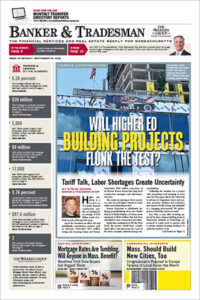Three aggrieved commercial tenants pushed the limits of Massachusetts General Laws Chapter 93A, when they successfully sued their landlord in Suffolk County Superior Court for multiple damages and attorneys’ fees after a ceiling collapse destroyed their businesses.
The tenants’ lawsuit, Kuong v. Wong, centered on a minor disaster at a 100-year-old building in Boston’s Chinatown. The building contained several commercial spaces and residential apartments. The three tenants leased small shops on the first floor, beneath a second-floor restaurant owned by the landlord’s affiliate. Although the tenants were immigrants to the United States, they were well-educated and experienced business people, who invested heavily in constructing leasehold improvements for their spaces.
Over a ten-year period, the tenants regularly complained about rodent infestations and malodorous water leakage from the restaurant. The landlord hired an exterminator to control the rodents, and took measures to prevent the leaks, but the results were unsatisfactory. The problems reached a tipping point in 2009 when the tenants’ ceiling collapsed, showering their premises with a vile mix of dead rodents, food debris, moldy plaster and other building materials. The city of Boston promptly closed the tenants’ shops. Inspections indicated that leaks from the second-floor restaurant caused much of the damage, but there was evidence that the tenants’ faulty construction activities in their spaces may have contributed to the leakage.
The tenants sued the landlord not only for garden-variety tort and breach of contract claims, but also for violating Chapter 93A, asserting that the landlord had knowingly and willfully engaged in unfair and deceptive business practices by failing to correct the rodent and leakage problems. The tenants’ statutory Chapter 93A claim raised the possibility of the tenants recovering double or triple damages against the landlord. After a jury returned a verdict against the landlord the Superior Court judge made specific findings and rulings on the Chapter 93A claim in June of this year, with punishing results to the landlord.
‘Willful Or Knowing’
In its written decision, the court noted that Chapter 93A violations often involve immoral, unethical, oppressive, or unscrupulous acts or practices causing substantial injury to others; and that whether particular misconduct violates the statute depends on the circumstances of each case. For a plaintiff to collect double or triple damages, the defendant’s misconduct must be “willful or knowing,” not merely negligent. However, a defendant’s recklessness – that is, conscious disregard of its obligations – may constitute willfulness under Chapter 93A, allowing a plaintiff to recover multiple damages against a defendant. Considering the facts in Kuong, the judge labeled the landlord’s failure to fix the rodent and leakage problems as “recklessness in the extreme,” and ruled that the landlord had willfully and knowingly committed unfair acts against the tenants. The judge awarded the tenants double damages (totaling over $1,000,000) against the landlord plus their attorneys’ fees and costs.
The facts of this case are unpleasant and extreme. However, the court’s decision is surprising, because it awarded multiple damages under Chapter 93A in a commercial dispute among experienced business people, where the landlord did not specifically intend to harm the tenants. The landlord is appealing the decision. Regardless of the appeal’s outcome, one can expect that Chapter 93A claims for multiple damages will appear more often in future commercial landlord-tenant disputes.
Christopher R. Vaccaro is an attorney in Stoneham. Email: cvacccaro@verizon.net






